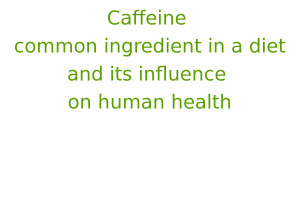Department of Nutrition and Dietetics Clinic of Metabolic Diseases and Gastroenterology,
Food and Nutrition Institute,
02-903 Warsaw, Powsińska 61/63 Street
The results of research on "Caffeine – common ingredient in a diet and its influence on human health" conducted by Regina Wierzejska (Annals of the National Institute of Hygien 2012, 63(2): 141-147.).
Caffeine is widely consumed by people of all ages. In the last period a market of caffeine-containing products, particularly energy drinks and food supplements increased. Caffeine for years is under discussion, whether has positive whether adverse impact on health. Children are a group of special anxieties. Caffeine is a stimulant of central nervous system and therefore is probably the most commonly used psychoactive substance in the world. The physiological effect of caffeine and the lack of nutrition value causes a great interest its impact on health, especially with reference to the risk of cardiovascular diseases. Results of scientific research are not clear.
The influence of caffeine on the human body is conditioned with the individual metabolism of caffeine which also depends on many endogenic and environmental factors. According to the current knowledge moderate caffeine intake by healthy adults at a dose level of 400 mg a day is not associated with adverse effects, but it also depends on other health determinants of a lifestyle.
Excessive caffeine consumption can cause negative health consequences such as psychomotor agitation, insomnia, headache, gastrointestinal complaints. Adverse effect of caffeine intoxication is classified in World Health Organization´s International Classification of Diseases (ICD-10). Metabolism of caffeine by pregnant woman is slowed down. Caffeine and its metabolites pass freely across the placenta into a fetus. For this reason pregnant women should limit caffeine intake. Children and adolescents should also limit daily caffeine consumption. It results from the influence of caffeine on the central nervous system in the period of rapid growth and the final stage of brain development, calcium balance and sleep duration.
Average daily caffeine consumption in European countries ranging from 280 – 490 mg. The highest caffeine intake is in Scandinavian countries what results from the great consumption of the coffee. As far as caffeine consumption by Polish population is concerned there is very few data in this subject so far. In the nineties of the previous century it was 141 mg per day, whereas according to recent survey daily caffeine intake by women from the Warsaw region was 251 mg and 15 % of examined women consumed an excessive quantity of caffeine (≥ 400 mg). Smokers consume more caffeine than nonsmokers, similarly to persons with mental illnesses. With reference to the caffeine consumption it should be underline that caffeine content in coffee and tea beverages varies greatly depending on the method of brewing whereas the content of caffeine in many brands of energy drinks can much vary. This should be taken into account in the daily caffeine intake.
The complete study "Caffeine – common ingredient in a diet and its influence on human health" (Regina Wierzejska) in pdf file format:
The original text taken from a:
![]() http://wydawnictwa.pzh.gov.pl/roczniki_pzh/kofeina-powszechny-skladnik-diety-i-jej-wplyw-na-zdrowie
http://wydawnictwa.pzh.gov.pl/roczniki_pzh/kofeina-powszechny-skladnik-diety-i-jej-wplyw-na-zdrowie
Annals of the National Institute of Hygien 2012, 63(2): 141-147.
Available under conditions of the license:![]() http://creativecommons.org/licenses/by-nc/3.0/
http://creativecommons.org/licenses/by-nc/3.0/
Translations
| The article "Caffeine – common ingredient in a diet and its influence on human health" in other languages | |
|---|---|
| Kofeina – powszechny składnik diety i jej wpływ na zdrowie (Regina Wierzejska) po Polsku: Kofeina – powszechny składnik diety i jej wpływ na zdrowie Department of Nutrition and Dietetics Clinic of Metabolic Diseases and Gastroenterology, Food and Nutrition Institute, 02-903 Warsaw, Powsińska 61/63 Street |  |












